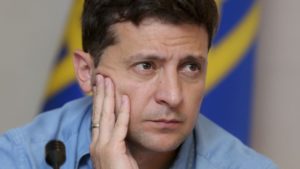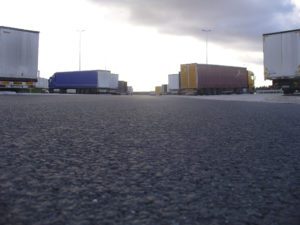
An expert survey, titled “100 days of President Volodymyr Zelensky,” conducted from August 19 to August 26 by Ilko Kucheriv Democratic Initiatives Foundation Fund was presented in Kyiv on Wednesday. Some 51 experts were included in the study. They said Zelensky’s main success in the first 100 days was the dissolution of the parliament and the further success of the Servant of the People Party in early parliamentary elections, which allowed the formation of a one-party majority.
Experts also noted the president’s foreign policy efforts: first foreign trips, establishing contacts with leaders of the EU countries, Canada, a planned meeting with U.S. President Donald Trump.
Among the successes, Zelensky’s initiatives on the peace process in Donbas are also mentioned, along with activation of the Minsk process, efforts to conduct negotiations in the “Normandy format,” the issue of prisoner exchange.
To the president’s failures, experts attribute individual staff appointments and appointments to government posts on the basis of personal acquaintance and loyalty, rather than professionalism. The same applies to the inclusion of people with an ambiguous reputation in the Servant of the People Party list.
Experts also note foreign policy failures – in particular, the lack of efforts to counteract the return of Russia to Parliamentary Assembly of the Council of Europe and the lack of initiative to tighten sanctions against Russia for not fulfilling the decision to release Ukrainian sailors and issuing passports in occupied Donbas.
Zelensky’s style of behavior during public meetings in the regions and the ineffectiveness of the ceasefire in Donbas was already regarded as a failure.
Experts believe that Zelensky’s main task is to confront Russian aggression by all diplomatic methods, including strengthening sanctions against Russia, preserving the “anti-Putin” coalition for the liberation of Donbas and Crimea, as well as Ukrainian political prisoners and captives.
For comparison, experts gave President Petro Poroshenko 6.3 points for his first 100 days, with his predecessor Viktor Yanukovych receiving 2.7 points. Yanukovych fled to Russia in early 2014.

1+1 Media Group intends to double the cost of media products in 2020, simultaneously it will introduce a 50% discount for the first quarter, director of the distribution and broadcast development department of the group told reporters on Tuesday.
According to the published plans of the media group, starting from the second quarter of 2020, the cost of a package of group’s channels for one subscriber per month for providers will be UAH 6 for linear rights (SD and HD) and UAH 1.5 for Catch Up rights. In 2021, this cost will be UAH 7 UAH and UAH 1.75, UAH 8 and UAH 2 in 2022 respectively.
“In 2020, we will technologically make everyone equal: whether it is an analog cable operator, an OTT provider, a DTH platform or an IPTV provider: the pricing policy will be the same for everyone…At the same time, since there are both SD and HD, no added cost to be fixed for HD, we will not monetize it separately. This is our promise to providers, the added value to their market. Accordingly, from the second quarter of 2020, the price will total UAH 6. In 2021 and 2022 there will no longer be these sharp price spikes…Next, we will foresee adjustment for inflation the same as it works in the classical distribution,” he said.
Malchevsky also reported that for Q1, 2020 the company will introduce a 50% discount for all media products of the group.
National bank of Ukraine’s official rates as of 28/08/19

Source: National Bank of Ukraine

Capital investment in Ukraine in January-June 2019 grew by 12.3%, while in the first quarter of 2019 – by 17.8%, the State Statistics Service reported on Tuesday. According to the State Statistics Service, after an increase in investments in agriculture, forestry and fisheries in the first quarter by 2.1%, a decrease of 8.6% was recorded in the first half of the year.
In wholesale and retail trade, growth slowed down from 18.9% to 6.3%, in transport, storage, postal and courier activities – from 20.8% to 4.7%, while in industry – from 32% to 30.8%, and in construction, an increase from 3.4% to 5% was recorded.
According to the State Statistics Service, in the first half of 2019, UAH 234 billion of capital investment was disbursed (excluding the temporarily occupied Crimea, Sevastopol and the JFO area).
In the regional context, the largest increase in capital investment in the first half of 2019 compared to the same period in 2018 was recorded in Volyn (by 76%), Kherson (by 68.5%), Mykolaiv (by 39.5%), Kyiv (by 25, 85), Chernivtsi (by 25.7%), Dnipropetrovsk (by 23.6%), Ternopil (by 21.4%), Luhansk (by 16.2%), Vinnytsia (by 12.3%), and Donetsk ( in 12.6%) regions.
According to statistics, capital investments for the reporting period decreased in Chernihiv (by 17%), Zakarpattia (by 15.8%), Zhytomyr (by 15.2%), Ivano-Frankivsk (by 9%), Odesa (by 7.2%), Rivne (5.1%) and Zaporizhia (4.4%) regions.
The main source of financing capital investment remains the own funds of enterprises and organizations, due to which 73.3% of the total volume of all investments has been used.
A significant share of capital investments was made in machinery, equipment and vehicles – 47.7%, buildings and structures – 43.6% of all investments.

The State Automobile Roads Agency of Ukraine, also known as Ukravtodor, plans to introduce the toll system for large trucks for using Ukrainian roads.
“It was my initiative to implement intelligent transport systems in Ukraine. In addition to Weight-in-Motion (WiM), this includes recording speeding and traffic analysis systems using cameras. The fourth part of the global intellectual transport system of Ukraine is tolling, that is, collecting payments from heavy vehicles for traveling on Ukrainian roads,” acting Head of Ukravtodor Slawomir Nowak said in an interview with Interfax-Ukraine.
He believes that the introduction of the toll will be a serious legislative change for Ukraine, which will significantly improve the condition of roads in the country.
“We need to pass a law that will regulate this toll. We urgently need to introduce an additional source for the Road Fund. There is a European principle: trucks, especially those that earn on transportation, must pay more for traveling on roads,” the acting head of the agency said.
According to Nowak, the volumes of road destruction due to overloaded transport are huge.
“The problem with overloaded tracks in Ukraine is very, very big,” he said.